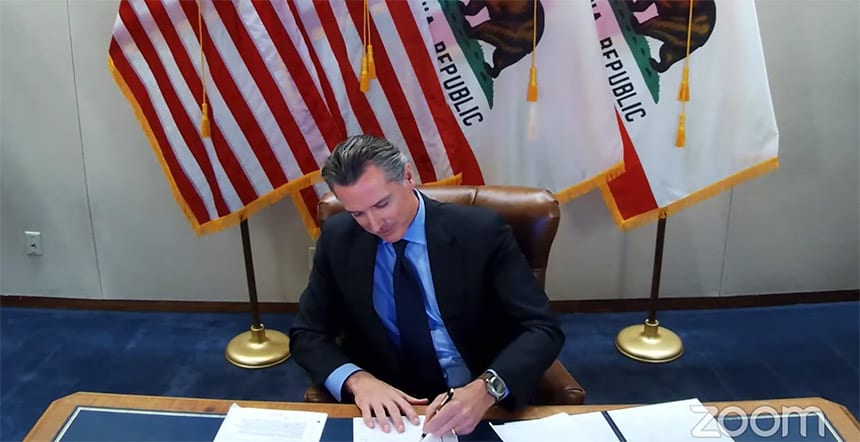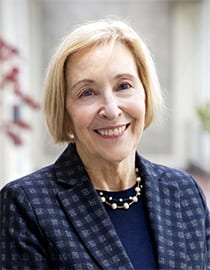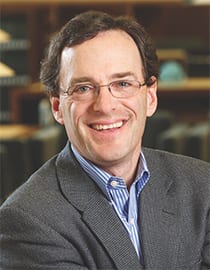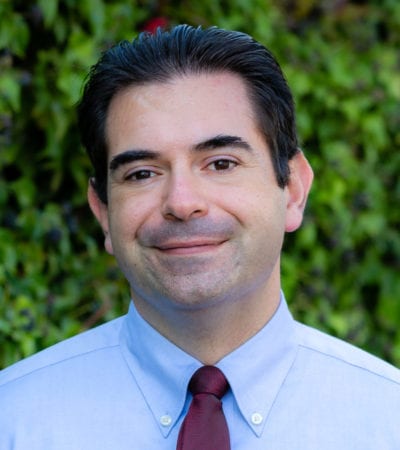
By Sarah Weld
Berkeley Law has made a splash in Sacramento before. This year, however, the school made some major waves.
In the final weeks of September, California Gov. Gavin Newsom signed into law seven bills spearheaded by Berkeley Law clinics and centers that focus on protecting residents’ civil, financial, and environmental rights.
A consistently strong presence in advocating for legislative policy in California, Berkeley Law this year marshaled a powerful confluence of efforts by faculty and students.
“Berkeley Law’s clinics have always worked to advance justice, and our faculty and students have regularly advocated on behalf of clients for statewide policy change,” says Clinical Program Director Laurel E. Fletcher. “But more than ever this year, the clinics have risen to meet the moment.”
Fletcher calls this increased focus on legislative action “a key opportunity to leverage our intellectual assets and commitments to justice to achieve real progress toward social justice in our state. The Berkeley Clinical Program is a model for law schools around the country.”

The bills aim to significantly reduce racial discrimination in jury selection, require companies to list toxic chemicals in beauty products, eliminate punitive adult and juvenile fees, keep young people out of the juvenile justice system, stop people from losing their homes over unsecured debts, and protect consumers from predatory finance companies.
“Our clinics are working with clients and partners to translate the everyday racial, economic, and environmental injustices experienced by millions of Californians into demands for meaningful change in Sacramento. I’ve never seen this breadth and depth of policy engagement at the law school, much less the staggering success during a very challenging legislative session,” says Jeffrey Selbin, director of the Policy Advocacy Clinic, which regularly represents community groups in Sacramento.
Diversifying the jury box
Assembly Bill 3070 will dramatically alter the selection of California criminal trial juries. In doing so, advocates anticipate African-American and Latinx defendants having their cases tried by juries that look more like them and more accurately reflect California’s demographics.

The bill was drafted by a team that included Berkeley Law’s Death Penalty Clinic faculty and students and was supported by the release of Whitewashing the Jury Box: How California Perpetuates the Discriminatory Exclusion of Black and Latinx Jurors, a clinic report. The exhaustive study investigates the history, legacy, and ongoing practice of excluding people of color — especially African Americans — from state juries through prosecutors’ peremptory challenges.
Among its requirements, the bill eliminates the requirement that the objecting party prove intentional discrimination, includes a list of presumptively invalid reasons for peremptory challenges, and requires courts to consider implicit bias.
“AB 3070 upends the process by which our courts have been deciding for over 40 years whether a party discriminated in the exercise of a peremptory challenge,” says Death Penalty Clinic Director Elisabeth Semel. “The current standard has been a failure: California courts did not apply it rigorously and the procedure itself tolerates discrimination. The statute requires lawyers — particularly prosecutors who disproportionately strike Black and Latinx jurors — to stop relying on stereotypes and racial proxies when they exercise a peremptory challenge.”
Detoxifying cosmetics
California consumers will soon be able to consult a state database to determine if toxic chemicals were used to add fragrance or flavor to products like shampoo, moisturizer, lipstick, and sunscreen.

The Environmental Law Clinic worked with client Breast Cancer Prevention Partners to conceive and draft Senate Bill 312, which forces cosmetic and personal care manufacturers to spell out the fragrances and flavor ingredients that appear on various lists of known-toxic or known-allergenic chemicals. The bill targets ingredients such as synthetic musks, which can disrupt hormone systems; styrene, a carcinogen; and phthalates, which have been linked to asthma and early puberty.
“This bill will help consumers protect themselves from unwanted exposures to toxic chemicals and allergens in their everyday products. And it will pressure manufacturers to remove those ingredients from the marketplace,” says Claudia Polsky ’96, director of the Environmental Law Clinic. “Breast Cancer Prevention Partners and its co-sponsors have taken California well beyond federal disclosure requirements. This kind of state leadership will ultimately help spur tighter federal regulation.”
Outlawing collection of juvenile fees
Tens of thousands of California families will no longer have to pay outstanding fees for their children’s involvement in the juvenile justice system. The Policy Advocacy Clinic’s extensive research on how juvenile fees destabilize families and perpetuate racial inequity provided vital support for legislation discharging all remaining juvenile fees.

Senate Bill 1290 is a bipartisan juvenile justice reform effort that requires counties to end the collection of fees that disproportionately extract wealth from low-income, Black and Latinx families. Supported by more than 60 groups across the state, the historic bill builds on the progress made by Senate Bill 190, which abolished the assessment of new juvenile fees in 2018.
“SB 1290 finally ends decades of racialized wealth extraction from some of California’s most vulnerable families. Including the fees discharged under the new law and voluntary actions taken by counties prior to its passage, families will be relieved of more than $360 million of these regressive taxes,” says Supervising Attorney Stephanie Campos-Bui ’14, who has led the clinic’s California effort since 2015. “It couldn’t come at a better time as many of these families are struggling because of COVID-19.”
Repealing unjust criminal fees
In the first reform of its kind nationwide, the Policy Advocacy Clinic represented the Debt Free Justice California coalition, which persuaded the Legislature to pass Assembly Bill 1869. A budget bill that eliminates 23 regressive and racially discriminatory fees in the adult criminal system going forward, AB 1869 also requires counties to write off an estimated $15.9 billion in outstanding fees.
This historic reform will reduce the harm caused by court-imposed debt and strengthen the economic security of low-income communities of color. The bill is a culmination of over two years of research, organizing, and advocacy by the clinic, Berkeley Law’s East Bay Community Law Center (EBCLC), and other members of Debt Free Justice California.

“The fees being eliminated, including county probation fees and public defender fees, represent some of the most costly and impactful criminal legal fees in California,” says Asher Waite-Jones ’16, supervising attorney of the center’s Clean Slate Clinic. “Their abolition will result in billions of dollars of financial freedom for our communities, but our fight is far from over. We will not stop until we have achieved a total divestment from criminal legal fees, and a total investment in Black and Brown individuals, families, and communities.”
A key driver of the bill, Campos-Bui says, “We hope that the work in California can be a source of hope for organizers and advocates in other states who may feel as if fee abolition is out of reach. It is indeed possible and we’re just getting started.”
Protecting consumers from financial predators
Californians will be better protected from predatory consumer finance companies thanks to Assembly Bill 1864. The bill significantly revamps the state’s Department of Business Oversight, giving it more power to oversee payday lenders, debt collectors, financial technology companies, and other service providers not currently regulated by the agency.
Modeled after the federal Consumer Financial Protection Bureau, the restructured state financial regulator — renamed the Department of Financial Protection and Innovation — will have increased authority and resources to go after businesses engaged in unfair, deceptive or abusive business practices.

The proposal for a revamped state agency was put forward three years ago by Berkeley Law lecturer Suzanne Martindale ’10, California Policy Lab Executive Director Evan White ’12, and Ted Mermin ’96, interim executive director of the Berkeley Center for Consumer Law & Economic Justice.
“This bill adds much needed oversight to the financial services marketplace at a critical time,” Mermin says. “So many families are near the edge of a financial cliff. With enhanced resources and personnel, the department can prevent harm from unscrupulous lenders and purveyors of ‘debt relief,’ and restore money to those who have been defrauded. And going forward, the new department will be able to respond more nimbly to financial innovations and to serve vulnerable populations like older Americans, students, veterans, and immigrants.”
Keeping people in their homes
Assembly Bill 2463, which prevents foreclosures for consumer debts unrelated to the home, will ensure that homeowners are no longer at risk of losing their homes because of small debts. Based on findings from Unsecured Debts: Insecure Communities, a report from EBCLC, the bill bars debt collectors from abusing existing law to seize a family’s home to satisfy an unpaid medical or phone bill, grandchild’s student loan, or other non-mortgage consumer debt. Many homeowners targeted by this practice are people of color, seniors, and low-income residents.

“Millions of Californians are running up debts as a result of the financial crisis and they need to be able to stay in their homes,” says Mermin, director of the California Low-Income Consumer Coalition, which includes EBCLC.
After seeing many clients in danger of losing their homes because of the existing law, EBCLC Consumer Justice Clinic Supervising Attorney Miguel Soto set out to change it, working with students to produce the report and help write the bill.
“We have fielded too many desperate calls from low-income Californians fearful that they will be out on the streets after a debt buyer tries to force the sale of their home,” Soto says. “Unscrupulous debt buyers have been targeting homeowners of color, forcing them to live under the constant threat of homelessness due to small unpaid consumer debts. We are restoring our clients’ housing security, safeguarding their savings, and defending their health.”
Sending young people to community programs, not probation
Assembly Bill 901 ensures that California youth having trouble at school or at home are sent to community-based programs instead of probation and the juvenile justice system. Young people who have not been accused of a crime should not have to sign away their privacy rights, and be subject to surprise searches, unannounced home visits, restrictions on who they can speak to, and interrogations, say advocates, who include attorneys from EBCLC.

In Riverside County alone, over 3,000 young people were placed on probation between 2005 and 2016 for behavior like being late to class, having poor attendance, and being “easily persuaded by peers,” according to a recent lawsuit filed by the American Civil Liberties Union and the National Center for Youth Law. Black and Latinx students were disproportionately referred to probation for this normal adolescent behavior.
Oscar Lopez, interim director of the center’s Education Advocacy Clinic, and Whitney Rubenstein ’14, supervising attorney for the center’s Education Defense & Justice for Youth, both worked with partners to get the bill written and signed.
“This bill is another important step towards changing the punitive nature in which many students of color and students with disabilities are treated in schools,” Lopez says. “We’re thankful for the young people who shared their experiences and the organizers and advocates who made this victory possible.”